 What does turning 60 mean for a woman today – a woman who came of age in an era of visible women and who is reaching this milestone at a time when invisibility is still a common experience in older age.
What does turning 60 mean for a woman today – a woman who came of age in an era of visible women and who is reaching this milestone at a time when invisibility is still a common experience in older age.
New Zealand photographer Jenny O’Connor was approaching 60 herself when she started wondering: What would hitting 60 mean for her; and how were other women her age experiencing the moment?
O’Connor decided to focus her lens on the question. Many months of shooting later, her project resulted in an unusual book of word-and-image portraits: “Visible: 60 Women at 60.”
For her project, O’Connor spoke with and photographed 60 women who were turning 60 – most of them had responded to a Facebook post inviting participation – and asked each to write something about themselves; whatever they wanted to say. Then she built a photo shoot around each woman’s story, complete with props and costumes.
“I didn’t want it to be about women who have done great things or are well known, because my belief is we all do wonderful things,” she says.
A self-taught photographer, O’Connor works seven to eight months a year as a business consultant as a way to back her artistic work. “Photography gives me the ability to connect with people, hear their stories and do something with those stories through a visual medium, which is quite exciting.”
Since the book’s publication earlier in 2014, portraits from O’Connor’s series have been shown locally. She’s hoping “Visible” will eventually tour as an exhibition.
O’Connor spoke to us by Skype from her home in Wellington, New Zealand.
What inspired the title for this project: “Visible”?
My working title for the project was “Seeking 60,” and as the project grew and more women agreed to participate, we’d actually meet up. Lots of conversations came up around who we are, what we are thinking about when we’re 60, reflecting back on what it would have been like for our mothers and grandmothers to have been our age. The word “Visible” kept coming up because I think we shared this milestone feeling of being more certain about ourselves in some ways, but less certain in others.
So many of us now know that we are way more visible than our mothers and our grandmothers ever were. We’ve fought for things; we’ve been up front in human rights and other fights in our generation. Women found their voices in our generation. They went to work and they made choices about their lives. And most of them are still en route.
But there’s that little thing that niggles away at the back of the mind: “But, what now?” We’ve sort of been visible, we’ve done things that other generations have never done, we’ve found our voice, but is it going to matter? And how do people perceive us?
Jenny O’Connor self-portrait for “Visible”
Did your initial goal change as the project unfolded?
Originally it was just going to be an exhibition, I didn’t originally intend to do a book. At the 40 milestone gathering [when 40 women had signed on] I said to them, I’m starting to think that this probably deserves to be sitting around on coffee tables rather than just a one-off exhibition event.
I never thought of it as being “my” project. I felt it was very much about us as a community of women with a shared experience of being this age. I wanted them to feel they had a big ownership in it. So for me having that sense we were doing this book together was really, really important.
The images tell stories – what was your process in creating each woman’s portrait with her?
Three things were non-negotiable: it would be full-length, it would have a consistently dark background, and the women needed to be looking straight at the camera. ‘Other than that, the world’s your oyster,’ I would tell them.
We would meet up for an hour or so and talk about how they’d like to be photographed. Inevitably they’d ask, “What am I going to wear?” And I’d say, “Well, it depends on what you want to say about yourself.” So we talked about the introducing props and styling. Sometimes I went to their homes to look through their wardrobes with them. Sometimes I would source the props, sometimes it was them. It was a quietly collaborative process. Then when they’d turn up on the day for the shoot, we would just do it.
Afterwards I would chose 10 or 15 out of the set and I would let them come up with the one that they liked. Sometimes It wasn’t the prettiest photo of them. It was all about what the picture said.
I had no input into their words. I felt that they knew themselves well enough and that is part of what this whole thing of being 60 is about – you can write your own words. You’re in charge.
Can you pick out a few of the women’s stories that you’d like to share here?
I’d never met Ro Cambridge, the woman with the dress made out of newspapers [pictured at top]. She’s a writer and we came up with this idea of making something out of books. So we went down to the local secondhand shop where she bought a whole bunch of books and disappeared. When she came back she’d ripped the pages out of these books she’d bought for 50 cents each and glued them onto these long strips of brown paper.
Diana Clarke wrote these words:
Seclusion
Solitude
Detachment
Interiority
Some of what I appreciate
About this stage of my life.
She said she learned at a very young age that it was wise for her to be secretive. And she said, “I’m not sure if I can do this, Jenny. I’m not like these other women and I don’t want any fuss around me.” So we talked about how we could portray that. I went down to the local costume shop and found a few capes and things like that, and that’s how we did this photograph.
Julia Bracegirdle, the woman with the bike, is a breast cancer survivor and actually has a missing breast. It’s interesting that people don’t notice it. We had quite a conversation about that because we didn’t know whether the photograph was going to be about her being a breast cancer survivor or her doing Ironman stuff. We decided it’s about who she is now, and if people look at her in this shirt they might realize she hasn’t got a breast.
I did a talk for a group of photographers and one of the women wanted to know about the photograph of Ros Rice with her avatar. Ros is quite open in her commentary about having met her husband through online dating. The woman at the talk said, “That’s so weird for a 60-year-old.” And I told her that’s what this book is all about. It’s all about saying or challenging some of those perceptions of what you think. She said, “But that’s something that teenagers do.” Well, no. Clearly not! It’s a really good example of blowing away some of those perceptions of what women at 60 are doing in this day and age.
What would your 60-year-old self tell your 30-year-old self?
I think my 60-year-old self would tell my 30-year-old self not to be so damn sure of myself. However, I would probably also say take risks. Don’t play it safe. Take sensible risks. Because it’s all about the journey, isn’t it? I had my children very young, so I’d also say, don’t be afraid of missing out on things, because there’s so much time to do what you want to do in life and you don’t have to do it in the order everybody else thinks you should.
What does “Aging with Attitude” mean to you?
Aging with attitude is that sense of knowing yourself a lot more and of ‘I can be who I am now and really nobody needs to tell me how I should dress, how I should be.’ And it’s about bucking those stereotypes. We’re not sitting around knitting, we’re doing stuff, we’re active, we’re intelligent.
Being a grandmother to my four teenage grandchildren is a huge part of my life. I thought they would have lost interest in me by now, but not so. Our relationship is stronger than ever and as a grandmother it’s lovely that they perceive you as aging with attitude. You’re modeling for them.
Watch a video slideshow of all 60 portraits
“Visible” isn’t currently distributed in the US, but you can see more images in this video.
- Visit O’Connor’s “Visible at 60” site to read excerpts and view images
- O’Connor’s blog contains behind-the-scenes stories about the portraits
- Follow O’Connor on Facebook
Photos: ©2014 Jenny O’Connor
“Visible” quotes: © 2014 Jenny O’Connor
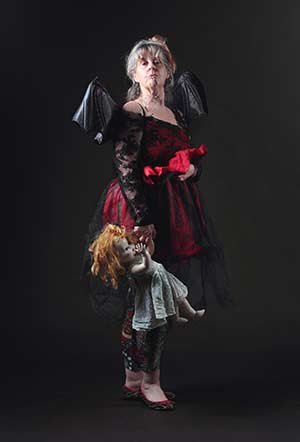
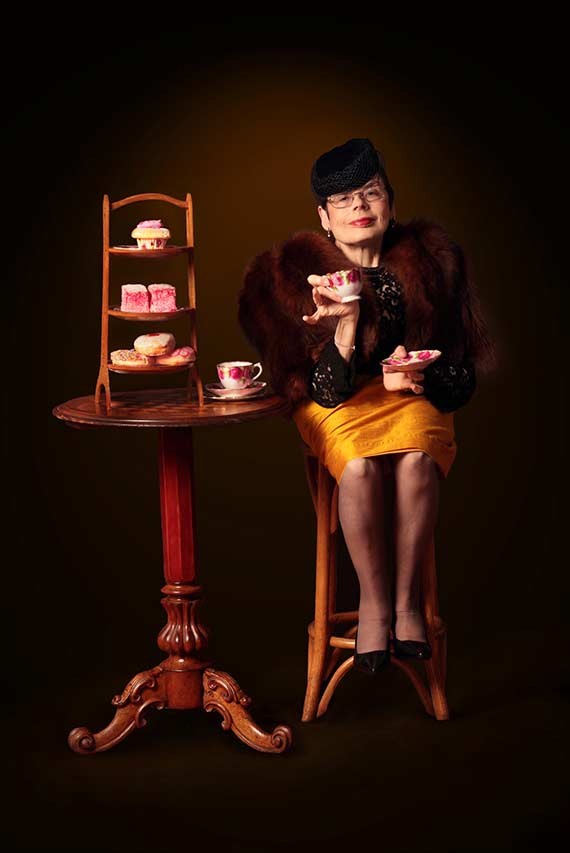
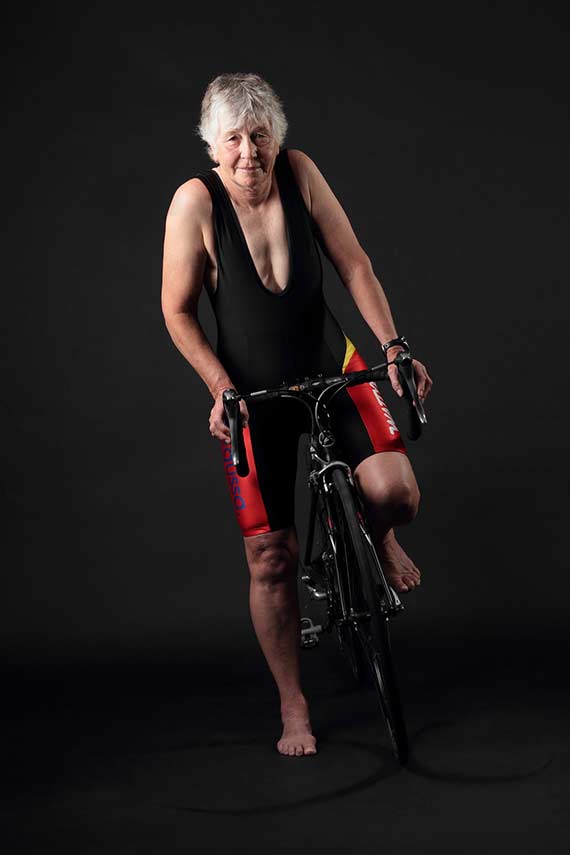
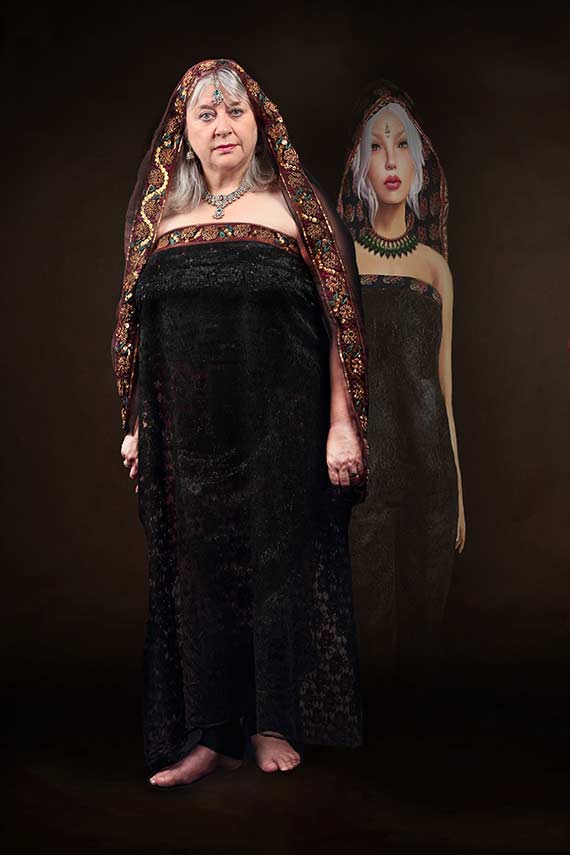

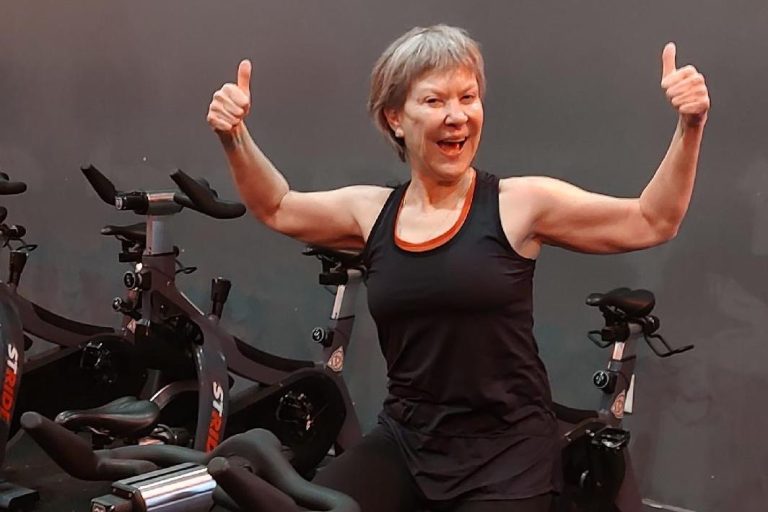
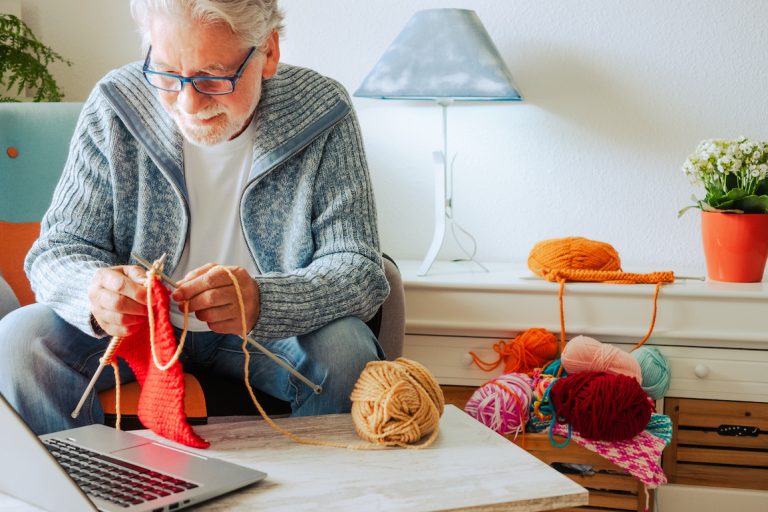
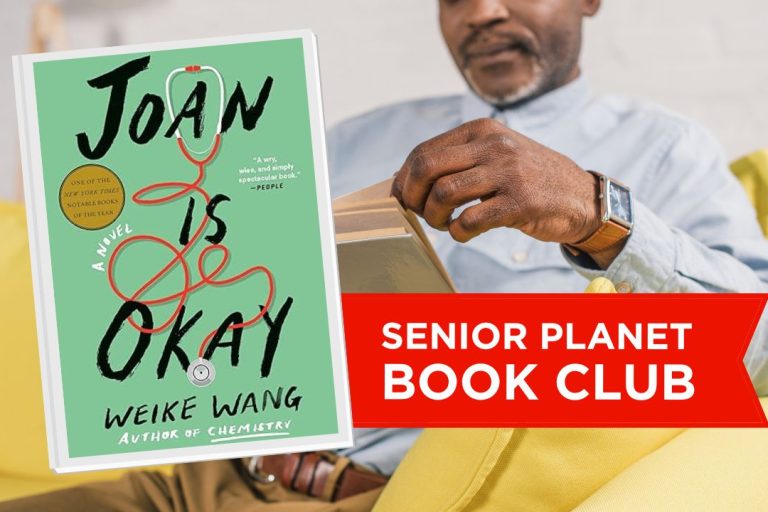
COMMENTS
34 responses to “Visible: 60 Women at 60”
3/28/16
Hello Jenny,
I was fascinated with your photography experience and outstanding meeting people sharing ideas from different countries of the world. I am well traveled-lady around the world while I was working at United Nation in New York. I am a teacher in High School and Montessori kids which so much enjoy playing guitar and Ukelili. Since I travel so much how I wish you could drop a line if your not busy. Please if you email me so I can share ideas from my experience while raveling before.
However, tell me what do you do right now, Do you enjoy traveling from different countries? How far have you visits other countries and which country you like best. I am looking forward about your project right now and please share your activities. Thanks
Dots All….
Sincerely,
Lalia
I’ve reached my 60’s but I don’t feel a day over 40!!! I’ve decided that each Birthday from now on I will go backwards by one year!
Thats great. Hope the body does what the mind whats it to:)
http://www.visibleat60.com
Thank you .. so real .. so beautiful and so … uplifting. 60 is my next big one and this has made me think a little differently …
Hi Yve. Thanks fork taking the time to get in touch. It does seem like a bigger milestone than others doesn’t it, which is why I did this project. The project will go into another phase next year as I intend to start travelling and meeting women from other parts of the world and opening up this conversation. So it you are interested in staying in touch drop me an email through the website http://www.visibleat60.com and I’ll add to my database and who knows we may meet in person sometime soon:) Jenny
In 2004, when I when I was 75, I created an exhibition called Seniors Legacy. I photographed 76 people 75 to 94 in 8 counties in Pennsylvania who were actively contributing to their community. They wrote about what they wanted people to know about being older and listed their activities. It and they were awesome! I wish you all much success and a happy, healthy life!
Helen, that sounds like a great project. Is it published anywhere, online or in print?
Hi Helen. You bring me to tears. I’m hoping to get to the US in the next 12 months and would love to meet you if that opportunity arose.
You are welcome to email me through my website http://www.visibleat60.com if you would like to.
Warm regards, Jenny
Helen
An amazing project you did! Are the details available in print! If not, please try to get it done… I am elevated by your spirit. I wonder if someone would ever undertake a journey again with women over 75 years!
Thank you ! Ordered a copy for myself and one for my friend , we live in New York and Texas . I hope this is not a problem . We both turned 60 this year , Again , thank you .
LOVE Your concept! I would very much like to see the Images of each Woman last longer on Your Video though. Each Image is worthy of lingering with. One of the things about Getting Older ( I am 68 ) is that I Appreciate slowing down and paying more attention to each Moment. As a Photographer doing so has added significant depth to the Emotional Content of My Own Work. Thank You for this Posting . Ethan / Evanthelens
Thanks Ethan and I get what you say. I’m going to do an e-book soon but maybe a I do a ‘lingering’ version of the video as well.
Hi Ethan
I’m uploading the individual images through my Twitter Account – about one a day – and a snippet from each woman’s words in the book. That way you can at least linger a bit longer on the images. Can I get to see your photography on-line anywhere?
https://twitter.com/visibleat60
Nearing my 61st year, I absolutely loved this montage and the message it sends!
Having just had my 60th birthday this is sooooo wonderful. Thank you so much! x
Great post — the pics were enlightening. — barbara
Ms O’Conner, I think you’re doing a great work. Its a very interesting subject/project and would like to continue to follow your website!
Thanks, Huani
I loved being part of this fabulous project of Jenny’s. She is a wonderful photographer and put me at ease while taking photos of me semi-naked – never done that before in my life. What a way to celebrate being in my sixties :-)
Lovely article about Jenny’s fabulous book
Oh my gosh! I’ve just woken up and seen that there are now 2000 ‘likes’ on this article. There’s only 4.5 million people in our little country at the bottom of the world, so for me that’a a lot:)
I’m so delighted to see us NZ women standing proud and looking out to world. In our Maori language we say ‘Kia kaha. We stand strong together’. And I’m starting to feel a real sense of that from this book and the women from around the world who are clearly resonating with it. Thank you.
Lovely. Wonderful. Thank you. Women are beautiful at every age.
Loved this article and the photos – what an inspiration to us all. This is what my ‘The Visible Woman – More Lust, Less Must’ is all about – not putting yourself in a comfortable box and forgetting about yourself and your dreams.
Irene – a fiesty woman with attitude from Essex, via Glasgow. http://www.thevisiblewoman.com
Hi Irene
I’ve just ‘liked’ your facebook page and hopefully will see you over there sometime. Feel free to post this article on your page. Go well:)
I am a subject in the book. I found it very liberating to have my photograph taken, a thing I have avoided in the past. A great project to have been involved in.
I’m another of the “Visible” women (I am a suitably decorative prop for my highly photogenic cat, she tells me). All through the project that gave us Jenny’s book, I have been stunned and delighted about what all of the portraits showed. As much as showing the collective nature of our lives to others, it showed us to ourselves and it was a joyous re-encounter. A mirror just doesn’t have the same magic. As a Quaker, I’m always delighted by the opening words I found when first I opened a small book we use. The first words were “Live Adventurously”. Jenny’s book has shown us doing just that
i love this being 64 myself.. i am having a hard time accepting being of age.. and sometimes do not want my photo taken.. love it love grand job.. xoxo
“great to see the idea has gone global, a wonderful project to be involved in”.. the accidental covergirl
I am the person with the avatar. (Ros) It’s great to see this book strikes such a cord with women all over the world. I have just returned from a visit to the States and saw a lot of amazing women who are obviously over 60 and living life to the full. Just one correction. I didn’t meet my husband on an internet dating site. I met him in a virtual world. I didn’t go there to find someone, I went there to enjoy music and art, and so did he. We met there through virtual interests :)
Hi Ros,
Thank you for sharing your story and avatar with us! Sorry about the error. What a cool way to meet someone!
Indeed Linda, virtual worlds are very different environments than dating sites. They are places you can talk and interact with people in real time. We both love to go to virtual concerts where musicians live-stream music, and amazing art exhibitions that use multi- dimensional opportunities to create and display art.
For older people this is a way to keep involved with the things you love in real life, without having to pay out lots of money or to travel too far. It’s an underrated and safe way to continue to be involved in life no matter what age. I recommend trying it :)
How do you join in virtual sites?
Hi Essie, google them you will be surprised there are a few. Here is an interview with a fashion designer in a virtual world.
https://www.youtube.com/watch?v=hNtup7U6A24&index=3&list=PLI0b2jAH3oFvr6J0AhWroB9lmOXRN2xLV
Linda,
Congratulations on a wonderful article encouraging all of us to come out of the shadows and become gloriously visible.
Jenny, thanks for the care and creativity you gave this superb photographic project capturing the inner spirit of these beautiful women. I was just in your beautiful NZ on vacation.
Ros, thanks for explaining virtual worlds. Now I have to explore this way of connecting.
Great idea. Love the photos.
Hi Deborah. I’m Jenny the photographer. Its really lovely to know that even though I live at the bottom of the world in New Zealand, that we seem to have shared experiences of our life transitions.
Sign Up for Newsletters
There’s always a lot going on in the Senior Planet universe. Get our newsletters to make sure you never miss a thing!
Sign Up Now
Join Senior Planet Community
Senior Planet Community is our social media platform designed specifically for older adult users. Engage in thought-provoking discussions, make new friends, and share resources all on a safe and ad-free platform.
Join the Conversation Today
Upcoming Online Classes
Calendar of Events
S Sun
M Mon
T Tue
W Wed
T Thu
F Fri
S Sat
0 events,
16 events,
Good Morning, Senior Planet!
Good Morning, Senior Planet!
Start your week off right with a preview of the week's upcoming programs and a guided meditation session!
Morning Stretch
Morning Stretch
Start your day with a short morning stretch!
Functional Strength Training
Functional Strength Training
Use bodyweight, bands, and dumbbells to build your strength.
MyChart
MyChart
Learn how MyChart can help you keep all your health information in one place, communicate with your providers, and have a virtual visit.
Fit Fusion Workout
Fit Fusion Workout
Get your heart pumping during this fun, high-energy workout!
14 events,
30
Stronger Bones
Stronger Bones
Activate the joints and muscles and increase mental focus during this exercise class.
Morning Stretch
Morning Stretch
Start your day with a short morning stretch!
Introduction to Learning Apps – Languages & The Arts
Introduction to Learning Apps – Languages & The Arts
This presentation will introduce you to apps that help you learn different languages, explore the arts and art history, and even show you how to play instruments.
Smartphones at a Glance
Smartphones at a Glance
How smart are they? We'll tell you all about smartphones.
Chair Yoga
Chair Yoga
Follow various cues to develop body alignment and breath awareness.
14 events,
1
Morning Stretch
Morning Stretch
Start your day with a short morning stretch!
Virtual Tour: Belfast, Ireland
Virtual Tour: Belfast, Ireland
Join Senior Planet and our tour guides from Discover Live for a virtual visit to Belfast, Ireland!
點對點付款
點對點付款
如果您還不太了解點對點付款,快來聽聽這堂講座!
Fit Fusion Workout
Fit Fusion Workout
Get your heart pumping during this fun, high-energy workout!
YouTube
YouTube
This presentation will give an overview of the free content available on YouTube and show you how to navigate the site with ease.
13 events,
2
Balance/Strength
Balance/Strength
Activate the joints and muscles to become limber and increase balance during this exercise class.
Morning Stretch
Morning Stretch
Start your day with a short morning stretch!
Internet of Things: Wearables
Internet of Things: Wearables
Learn about the health, wellness, and personal safety benefits of wearable technology.
Saving Money with Tech
Saving Money with Tech
Explore ways that tech can help you save money and manage your finances!
eBay & PayPal
eBay & PayPal
This lecture provides an overview of the popular auction website eBay and the pioneer online payment service PayPal.
10 events,
3
Morning Stretch
Morning Stretch
Start your day with a short morning stretch!
Internet of Things: Healthcare
Internet of Things: Healthcare
Come learn how the medical industry is embracing the Internet of Things (IoT) technology to treat patients remotely.
Introducción a la IA
Introducción a la IA
¡Venga a chatear con ChatGPT y aprenda sobre IA!
Taijiquan (Tai Chi)
Taijiquan (Tai Chi)
Relax your mind and strengthen your body with this gentle exercise class.
Introduction to Heart Rate Monitor Apps
Introduction to Heart Rate Monitor Apps
Did you know your phone can measure your heart rate? Learn about free heart rate monitor apps and why they can be useful.
0 events,
4
0 events,
5
14 events,
6
Good Morning, Senior Planet!
Good Morning, Senior Planet!
Start your week off right with a preview of the week's upcoming programs and a guided meditation session!
Morning Stretch
Morning Stretch
Start your day with a short morning stretch!
Fitness Apps
Fitness Apps
Registration required.
Learn how fitness apps can help you track and conquer your goals!
Functional Strength Training
Functional Strength Training
Use bodyweight, bands, and dumbbells to build your strength.
Fit Fusion Workout
Fit Fusion Workout
Get your heart pumping during this fun, high-energy workout!
15 events,
7
Stronger Bones
Stronger Bones
Activate the joints and muscles and increase mental focus during this exercise class.
Morning Stretch
Morning Stretch
Start your day with a short morning stretch!
Introduction to Heart Rate Monitor Apps
Introduction to Heart Rate Monitor Apps
Registration required.
Did you know your phone can measure your heart rate? Learn about free heart rate monitor apps and why they can be useful.
iPhones
iPhones
In this lecture you’ll learn about the latest iPhone, its features and what to consider if you’re thinking of buying one.
AI Image Generators
AI Image Generators
Go beyond stick figures and bring your imagination to life with AI image generators!
13 events,
8
Morning Stretch
Morning Stretch
Start your day with a short morning stretch!
Introduction to Estate Planning Resources & Tools
Introduction to Estate Planning Resources & Tools
Registration required.
A simple plan is better than no plan! Get to know a few free and low-cost resources that make it simple to plan your estate.
智能手機攝影簡介
智能手機攝影簡介
在手機上也可以照下專頁的圖片!如果您對您手機上的這個功能還不清楚的話,您可別錯過這堂講座喔!
Fit Fusion Workout
Fit Fusion Workout
Get your heart pumping during this fun, high-energy workout!
Anti-Virus & Malware Removal Programs At a Glance
Anti-Virus & Malware Removal Programs At a Glance
Registration required.
Concerned about viruses and malware? Attend this lecture to learn how to keep your device safe!
14 events,
9
Balance/Strength
Balance/Strength
Activate the joints and muscles to become limber and increase balance during this exercise class.
Morning Stretch
Morning Stretch
Start your day with a short morning stretch!
Podcasts at a Glance
Podcasts at a Glance
Learn what Podcasts are and where to find them!
Introduction to Booking Vacation Stays Online
Introduction to Booking Vacation Stays Online
Need a vacation? Learn about popular websites and apps for booking vacation rentals.
Streaming & Smart TVs
Streaming & Smart TVs
This presentation will introduce streaming: what it is, how to use it, and the variety of content available.
10 events,
10
Morning Stretch
Morning Stretch
Start your day with a short morning stretch!
Introducción a chatear con IA
Introducción a chatear con IA
Aprenda cómo aprovechar al máximo ChatGPT y otros software de IA.
IoT: Smart Homes
IoT: Smart Homes
Want to live like the Jetsons? Learn how smart home technology is making that a reality!
Taijiquan (Tai Chi)
Taijiquan (Tai Chi)
Relax your mind and strengthen your body with this gentle exercise class.
Tech Tips for Disaster Preparedness
Tech Tips for Disaster Preparedness
Technology can play an important role in making sure you’re prepared for an emergency. Come to this lecture to find out how.
0 events,
11
0 events,
12
15 events,
13
Good Morning, Senior Planet!
Good Morning, Senior Planet!
Start your week off right with a preview of the week's upcoming programs and a guided meditation session!
Morning Stretch
Morning Stretch
Start your day with a short morning stretch!
Mindfulness Apps
Mindfulness Apps
Registration required.
This lecture introduces mindfulness and its physical and mental benefits, such as reducing anxiety, improving memory, and lowering blood pressure.
Functional Strength Training
Functional Strength Training
Use bodyweight, bands, and dumbbells to build your strength.
Fit Fusion Workout
Fit Fusion Workout
Get your heart pumping during this fun, high-energy workout!
16 events,
14
Stronger Bones
Stronger Bones
Activate the joints and muscles and increase mental focus during this exercise class.
Morning Stretch
Morning Stretch
Start your day with a short morning stretch!
Drones
Drones
Learn why more and more drones are taking to the skies!
Online Rx Drug Resources
Online Rx Drug Resources
Registration required.
Learn helpful tools for understanding drug costs, comparing pharmacy prices, and finding discounts and coupons.
Chair Yoga
Chair Yoga
Follow various cues to develop body alignment and breath awareness.
14 events,
15
Morning Stretch
Morning Stretch
Start your day with a short morning stretch!
Virtual Museum Tours
Virtual Museum Tours
In this lecture we'll explore some of these virtual galleries, as well as digital tools that help bring art, architecture, and history to life!
線上購物
線上購物
本講座將提供有關使用流行網站 Amazon.com 在線購買從洗碗精到日用雜貨等所有商品的一般介紹。
Fit Fusion Workout
Fit Fusion Workout
Get your heart pumping during this fun, high-energy workout!
Intro to Smartphone Photography
Intro to Smartphone Photography
Say cheese! Learn more about your smartphone's camera.
13 events,
16
Balance/Strength
Balance/Strength
Activate the joints and muscles to become limber and increase balance during this exercise class.
Morning Stretch
Morning Stretch
Start your day with a short morning stretch!
Intro to Selling Online
Intro to Selling Online
This lecture will introduce you to different online platforms for selling all kinds of items, including furniture, clothing, household items, and more.
Messaging Apps
Messaging Apps
This lecture will go over the features of three widely-used apps: iMessages, Google Chats, and WhatsApp.
Job Searching in the Digital Age
Job Searching in the Digital Age
This lecture will provide an overview of how to use social media in your job search, demonstrate digital job searching tools like LinkedIn, and offer tips and advice to job seekers.
10 events,
17
Morning Stretch
Morning Stretch
Start your day with a short morning stretch!
Usos cotidianos de la IA
Usos cotidianos de la IA
¡Todo el mundo habla de IA! Asista a esta clase para ver cómo la IA es parte de la vida cotidiana.
Introduction to Nextdoor
Introduction to Nextdoor
This presentation will introduce you to the most common uses for the Nextdoor app and its main features, along with some best practices for using it safely.
Taijiquan (Tai Chi)
Taijiquan (Tai Chi)
Relax your mind and strengthen your body with this gentle exercise class.
All Things Zoom
All Things Zoom
This lecture will go over how to use Zoom to chat with friends & family, and take virtual classes with Senior Planet!
3 events,
18
Podcasts at a Glance
Podcasts at a Glance
Learn what Podcasts are and where to find them!
YouTube
YouTube
This presentation will give an overview of the free content available on YouTube and show you how to navigate the site with ease.
Internet of Things: Entertainment
Internet of Things: Entertainment
This lecture will explore the many ways we interact with IoT on a day-to-day basis and take a look at how it’s revolutionizing entire industries.
0 events,
19
15 events,
20
Good Morning, Senior Planet!
Good Morning, Senior Planet!
Start your week off right with a preview of the week's upcoming programs and a guided meditation session!
Morning Stretch
Morning Stretch
Start your day with a short morning stretch!
Internet of Things at a Glance
Internet of Things at a Glance
Registration required.
This lecture provides an overview of the vast world of the Internet of Things and discusses best practices for keeping your devices secure.
Functional Strength Training
Functional Strength Training
Use bodyweight, bands, and dumbbells to build your strength.
Fit Fusion Workout
Fit Fusion Workout
Get your heart pumping during this fun, high-energy workout!
15 events,
21
Stronger Bones
Stronger Bones
Activate the joints and muscles and increase mental focus during this exercise class.
Morning Stretch
Morning Stretch
Start your day with a short morning stretch!
Virtual Reality at a Glance
Virtual Reality at a Glance
Join us to learn about the exciting world of virtual reality and how you can experience it!
Internet of Things: Healthcare
Internet of Things: Healthcare
Registration required.
Come learn how the medical industry is embracing the Internet of Things (IoT) technology to treat patients remotely.
Chair Yoga
Chair Yoga
Follow various cues to develop body alignment and breath awareness.
13 events,
22
Morning Stretch
Morning Stretch
Start your day with a short morning stretch!
Video Chat
Video Chat
In this lecture, you’ll find out about some commonly-used, no or low-cost video chat apps, learn about their features, and explore video chat tips so you can present your best self when on a video chat.
YouTube
YouTube
歡迎您來學習如何使用 YouTube。
Fit Fusion Workout
Fit Fusion Workout
Get your heart pumping during this fun, high-energy workout!
Social Media for Job Searches
Social Media for Job Searches
In this lecture, we’ll discuss ways to make sure social media helps you when you’re looking for work!
14 events,
23
Balance/Strength
Balance/Strength
Activate the joints and muscles to become limber and increase balance during this exercise class.
Morning Stretch
Morning Stretch
Start your day with a short morning stretch!
Introduction to TikTok
Introduction to TikTok
This presentation will introduce you to TikTok, its rise to global popularity, and most common features, including privacy settings.
Graphic Design Tools
Graphic Design Tools
In this presentation, we'll explore the popular design platform, Canva, and demonstrate how you can get very creative with basic tools like Google Slides.
Chair Yoga
Chair Yoga
Follow various cues to develop body alignment and breath awareness.
10 events,
24
Morning Stretch
Morning Stretch
Start your day with a short morning stretch!
Generadores de imágenes de IA
Generadores de imágenes de IA
¡Consiga hacer algo más que figuras de palitos y haga que su imaginación cobre vida con generadores de imágenes de IA!
Intro to Gaming
Intro to Gaming
Game on! Come discover the world of gaming and start playing!
Taijiquan (Tai Chi)
Taijiquan (Tai Chi)
Relax your mind and strengthen your body with this gentle exercise class.
Digital Legacy at a Glance
Digital Legacy at a Glance
Will your digital content and social media pages live on forever? Come learn about your digital legacy options!
3 events,
25
Smartphones at a Glance
Smartphones at a Glance
How smart are they? We'll tell you all about smartphones.
Streaming & Smart TVs
Streaming & Smart TVs
This presentation will introduce streaming: what it is, how to use it, and the variety of content available.
IoT: Smart Homes
IoT: Smart Homes
Want to live like the Jetsons? Learn how smart home technology is making that a reality!
0 events,
26
0 events,
27
15 events,
28
Stronger Bones
Stronger Bones
Activate the joints and muscles and increase mental focus during this exercise class.
Morning Stretch
Morning Stretch
Start your day with a short morning stretch!
Smartphone Camera Uses Beyond Photography
Smartphone Camera Uses Beyond Photography
Come learn about QR codes, augmented reality apps, and more!
How to Choose a New Computer
How to Choose a New Computer
Registration required.
This informational session addresses some of the most common questions surrounding how to choose a new computer.
Chair Yoga
Chair Yoga
Follow various cues to develop body alignment and breath awareness.
12 events,
29
Morning Stretch
Morning Stretch
Start your day with a short morning stretch!
Virtual Tour: Lima, Peru
Virtual Tour: Lima, Peru
Join Senior Planet and our tour guides from Discover Live for a virtual visit to Lima, Peru!
Fit Fusion Workout
Fit Fusion Workout
Get your heart pumping during this fun, high-energy workout!
訊息應用程式
訊息應用程式
這次的講座會談到三款普遍的應用程式:iMessages、 Google Chat 和 微信 WeChat。您會學到如何傳送訊息、圖片、使用音訊和視訊通話, 以及瞭解這些應用程式如何確保您的訊息安全。
Introduction to Learning Apps – Languages & The Arts
Introduction to Learning Apps – Languages & The Arts
This presentation will introduce you to apps that help you learn different languages, explore the arts and art history, and even show you how to play instruments.
13 events,
30
Balance/Strength
Balance/Strength
Activate the joints and muscles to become limber and increase balance during this exercise class.
Morning Stretch
Morning Stretch
Start your day with a short morning stretch!
Digital Tools to Boost your Business
Digital Tools to Boost your Business
Learn about online tools to jump-start your start-up.
Chair Yoga
Chair Yoga
Follow various cues to develop body alignment and breath awareness.
Saving Money with Tech
Saving Money with Tech
Explore ways that tech can help you save money and manage your finances!
11 events,
31
Morning Stretch
Morning Stretch
Start your day with a short morning stretch!
¿Es eso IA?
¿Es eso IA?
¿Podemos realmente creer lo que vemos? ¡Venga a esta clase para acostumbrarse a reconocer la IA!
Gardening Tech At a Glance
Gardening Tech At a Glance
Can tech give you a green thumb? Come to this lecture to find out!
Taijiquan (Tai Chi)
Taijiquan (Tai Chi)
Relax your mind and strengthen your body with this gentle exercise class.
Understanding Bluetooth
Understanding Bluetooth
We’ll explain Bluetooth technology, how it works, and the way it impacts everyday life.
3 events,
1
Virtual Reality at a Glance
Virtual Reality at a Glance
Join us to learn about the exciting world of virtual reality and how you can experience it!
Intro to Gaming
Intro to Gaming
Game on! Come discover the world of gaming and start playing!
Virtual Museum Tours
Virtual Museum Tours
In this lecture we'll explore some of these virtual galleries, as well as digital tools that help bring art, architecture, and history to life!
Good Morning, Senior Planet!
Morning Stretch
Functional Strength Training
MyChart
Fit Fusion Workout
Stronger Bones
Morning Stretch
Introduction to Learning Apps – Languages & The Arts
Smartphones at a Glance
Chair Yoga
Morning Stretch
Virtual Tour: Belfast, Ireland
點對點付款
Fit Fusion Workout
YouTube
Balance/Strength
Morning Stretch
Internet of Things: Wearables
Saving Money with Tech
eBay & PayPal
Morning Stretch
Internet of Things: Healthcare
Introducción a la IA
Taijiquan (Tai Chi)
Introduction to Heart Rate Monitor Apps
Good Morning, Senior Planet!
Morning Stretch
Fitness Apps
Functional Strength Training
Fit Fusion Workout
Stronger Bones
Morning Stretch
Introduction to Heart Rate Monitor Apps
iPhones
AI Image Generators
Morning Stretch
Introduction to Estate Planning Resources & Tools
智能手機攝影簡介
Fit Fusion Workout
Anti-Virus & Malware Removal Programs At a Glance
Balance/Strength
Morning Stretch
Podcasts at a Glance
Introduction to Booking Vacation Stays Online
Streaming & Smart TVs
Morning Stretch
Introducción a chatear con IA
IoT: Smart Homes
Taijiquan (Tai Chi)
Tech Tips for Disaster Preparedness
Good Morning, Senior Planet!
Morning Stretch
Mindfulness Apps
Functional Strength Training
Fit Fusion Workout
Good Morning, Senior Planet!
Morning Stretch
Mindfulness Apps
Functional Strength Training
Fit Fusion Workout
Stronger Bones
Morning Stretch
Drones
Online Rx Drug Resources
Chair Yoga
Morning Stretch
Virtual Museum Tours
線上購物
Fit Fusion Workout
Intro to Smartphone Photography
Balance/Strength
Morning Stretch
Intro to Selling Online
Messaging Apps
Job Searching in the Digital Age
Morning Stretch
Usos cotidianos de la IA
Introduction to Nextdoor
Taijiquan (Tai Chi)
All Things Zoom
Podcasts at a Glance
YouTube
Internet of Things: Entertainment
Good Morning, Senior Planet!
Morning Stretch
Internet of Things at a Glance
Functional Strength Training
Fit Fusion Workout
Stronger Bones
Morning Stretch
Virtual Reality at a Glance
Internet of Things: Healthcare
Chair Yoga
Morning Stretch
Video Chat
YouTube
Fit Fusion Workout
Social Media for Job Searches
Balance/Strength
Morning Stretch
Introduction to TikTok
Graphic Design Tools
Chair Yoga
Morning Stretch
Generadores de imágenes de IA
Intro to Gaming
Taijiquan (Tai Chi)
Digital Legacy at a Glance
Smartphones at a Glance
Streaming & Smart TVs
IoT: Smart Homes
Stronger Bones
Morning Stretch
Smartphone Camera Uses Beyond Photography
How to Choose a New Computer
Chair Yoga
Morning Stretch
Virtual Tour: Lima, Peru
Fit Fusion Workout
訊息應用程式
Introduction to Learning Apps – Languages & The Arts
Balance/Strength
Morning Stretch
Digital Tools to Boost your Business
Chair Yoga
Saving Money with Tech
Morning Stretch
¿Es eso IA?
Gardening Tech At a Glance
Taijiquan (Tai Chi)
Understanding Bluetooth
Virtual Reality at a Glance
Intro to Gaming
Virtual Museum Tours
Recent Articles
Recent Comments